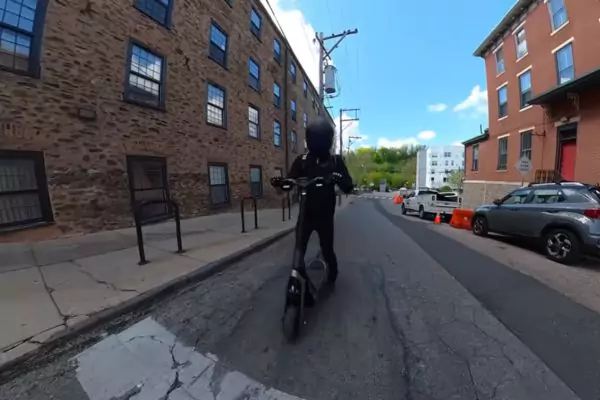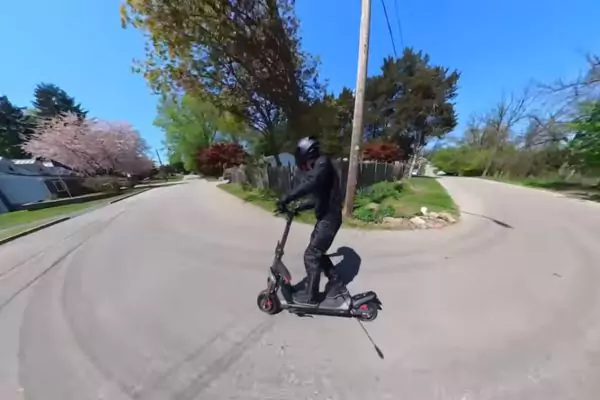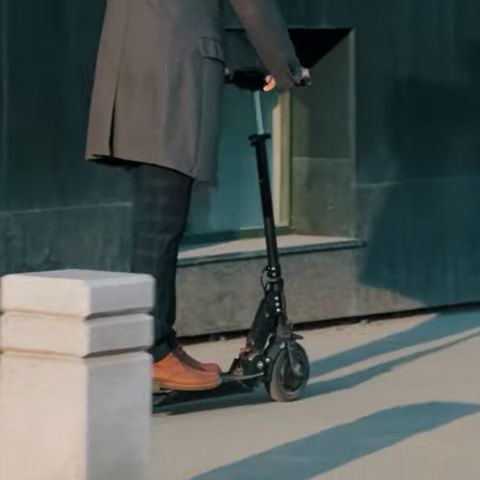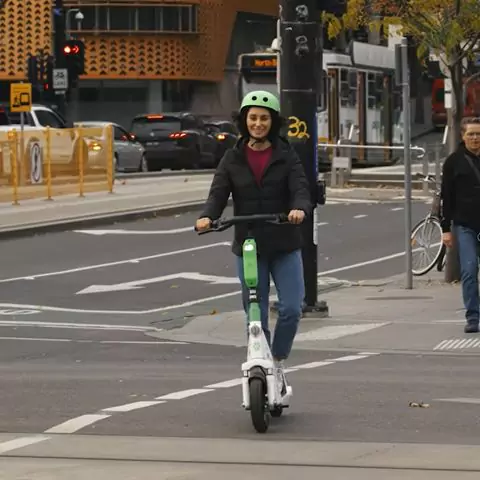In Pennsylvania, electric scooters are considered “motorized vehicles” and are subject to the state’s vehicle code. Riders must be at least 16 years old, wear a helmet, and follow all traffic laws.
Electric scooters are gaining popularity as a convenient and eco-friendly mode of transportation in Pennsylvania. However, it’s essential for riders to be aware of the state’s specific laws and regulations regarding their use. Understanding the rules can help ensure a safe and legal riding experience.
This article will provide an overview of electric scooter laws in Pennsylvania, including age and safety requirements, where they can be ridden, and any licensing or registration obligations. By familiarizing yourself with these regulations, you can enjoy your electric scooter while staying compliant with the law.
Contents
Legal Definition Of Electric Scooter In Pennsylvania

Electric scooters are becoming an increasingly popular mode of transportation in urban areas, including in Pennsylvania. It’s essential for riders to understand the legal framework surrounding electric scooters to ensure compliance with state laws and minimize the risk of fines or penalties. In Pennsylvania, the legal definition of electric scooters and how they are classified under state law play a crucial role in determining the rules and regulations that apply to their use.
Definition Of An Electric Scooter
Under Pennsylvania law, an electric scooter is defined as a “motorized scooter” or “miniature motorcycle” that is designed to be operated on highways and is equipped with handlebars and a floorboard for standing while riding. These devices are powered by electric motors and do not meet the legal definition of a vehicle or motorcycle.
Classifying Electric Scooters Under Pa Law
In Pennsylvania, electric scooters are classified as “electric personal assistive mobility devices” (EPAMDs) under state law. These devices are subject to specific regulations and restrictions, including where they can be ridden, speed limits, and equipment requirements. It’s important for riders to be aware of these classifications and the corresponding rules to ensure safe and lawful use of electric scooters in Pennsylvania.
Pennsylvania State Laws On Electric Scooters

Electric scooters have gained popularity as a convenient and eco-friendly mode of transportation in Pennsylvania. However, it’s crucial to understand the state laws governing their use to ensure compliance and safety. Let’s delve into the current regulations, registration and licensing requirements, and age restrictions for electric scooter operation in Pennsylvania.
Current Regulations Governing Electric Scooters
In Pennsylvania, electric scooters are classified as “motor-driven cycles” under state law. According to Title 75, Section 102 of the Pennsylvania Consolidated Statutes, electric scooters are defined as vehicles with no more than three wheels, a maximum speed of 20 miles per hour, and a maximum engine capacity of 50 cubic centimeters. These regulations outline the permissible specifications and operation of electric scooters in the state.
Overview Of Registration And Licensing Requirements
As of the latest regulations, electric scooters in Pennsylvania fall under the same registration and licensing requirements as motorcycles. This means that individuals operating electric scooters must possess a valid Class M or Class C driver’s license, along with registering their vehicle with the Pennsylvania Department of Transportation. Additionally, owners are required to obtain the necessary insurance coverage for their electric scooters.
Age Restrictions For Electric Scooter Operation
Those wishing to operate electric scooters in Pennsylvania should be aware of the age restrictions in place. According to state laws, individuals under the age of 16 are prohibited from operating electric scooters, as they are classified as motor-driven cycles. It’s important for parents and guardians to ensure that young riders adhere to these age restrictions to prevent legal repercussions and, more importantly, promote safety on the road.
Safety Requirements For Electric Scooters In Pennsylvania
As electric scooters gain popularity as a convenient mode of transportation in Pennsylvania, it’s crucial for riders to understand the safety requirements mandated by the state government. Adhering to these regulations not only ensures the rider’s safety but also contributes to the overall safety of pedestrians and other road users.
Mandatory Safety Equipment For Electric Scooter Riders
When operating an electric scooter in Pennsylvania, riders are required to wear a helmet approved by the Department of Transportation (DOT). Additionally, the scooter must be equipped with a white front headlamp and a red rear reflector or taillight to enhance visibility, especially during low light conditions. It’s essential for riders to prioritize their safety by proactively using these safety accessories.
Speed Limits And Prohibited Areas For Electric Scooters
In Pennsylvania, electric scooters are subject to a maximum speed limit of 20 miles per hour. It’s important for riders to adhere to this speed limit to ensure the safety of themselves and others. Moreover, electric scooters are prohibited from operating on sidewalks and pedestrian pathways. By respecting these regulations, riders can contribute to a safer environment for pedestrians and fellow road users.
Responsibilities Of Electric Scooter Riders And Pedestrians
Electric scooter riders are responsible for obeying all traffic laws and regulations applicable to motor vehicles, including yielding to pedestrians at crosswalks and intersections. On the other hand, pedestrians are responsible for being aware of their surroundings and watching for electric scooters when crossing roads or pathways. By embracing their respective responsibilities, both riders and pedestrians can coexist harmoniously and promote safety.
Understanding Liability And Insurance Laws
Liability Of Electric Scooter Riders In Accidents
When operating electric scooters in Pennsylvania, riders must adhere to the state’s traffic and liability laws. In the event of an accident, riders can be held liable for any injuries or damages caused if they are found to be at fault. It’s crucial for scooter riders to exercise caution and follow all traffic laws to minimize the risk of accidents and potential liability.
Mandatory Insurance Requirements For Electric Scooter Owners
Pennsylvania does not require electric scooter owners to carry liability insurance specifically for their scooters. However, riders are encouraged to consider obtaining coverage to protect themselves and others in the event of an accident. In some cases, homeowners’ or renters’ insurance policies may offer liability coverage for scooter accidents. It is important for scooter owners to consult with their insurance provider to understand their coverage options and ensure they are adequately protected.
Legal Recourse For Accidents Involving Electric Scooters
In the unfortunate event of an accident involving an electric scooter, riders and other parties involved may seek legal recourse to recover damages. The injured party can file a personal injury claim against the at-fault party, seeking compensation for medical expenses, lost wages, and pain and suffering. Enlisting the assistance of a knowledgeable personal injury attorney can help individuals navigate the legal process and pursue the compensation they deserve.
Proposed Legislation Impacting Electric Scooter Laws
Electric scooters have become a popular mode of transportation in Pennsylvania, and as such, the state legislature has been considering amendments to the existing laws governing their use. The proposed legislation could significantly impact how electric scooters are regulated and utilized in the state. Here’s a closer look at the recent proposals, potential changes in regulations, and the community response to these proposed revisions.
Recent Proposals For Amendments To Current Laws
The Pennsylvania legislature has introduced several proposals aimed at amending current electric scooter laws. Some of these proposals focus on defining the legal parameters for riding electric scooters on public roads and pathways, setting age restrictions for riders, establishing speed limits, and regulating parking and usage in urban areas.
Potential Changes In Regulations And Their Impact On Riders
If these proposed amendments are enacted, riders may be required to adhere to stricter regulations regarding where and how they can operate electric scooters. For instance, speed limits and parking restrictions could affect the convenience and accessibility of using electric scooters for short trips and commuting. Additionally, age restrictions may limit who can legally ride electric scooters in Pennsylvania.
Community Response And Public Opinion On Proposed Revisions
The proposed revisions to the electric scooter laws in Pennsylvania have sparked a significant amount of public debate and discourse. While some individuals advocate for these stricter regulations as a means of promoting safety and order, others express concerns about the potential limitations and inconvenience these changes may impose on electric scooter riders. The divergent views within the community highlight the complex nature of legislating electric scooter usage.
FAQs
Do You Need a License to Ride a Scooter in Pennsylvania?
In Pennsylvania, you do not need a license to ride a scooter. However, you must be 16 years old and have a valid driver’s license if you want to operate a motorized scooter on public roads. If you’re planning to ride your scooter on sidewalks or other off-road areas, there is no age limit.
Do Police Stop You on an Electric Scooter?
Yes, the police can stop you on an electric scooter. However, they are more likely to give you a warning if you are not breaking any traffic laws. If you are breaking traffic laws, then you may be ticketed or arrested.
Can I Drive My Electric Scooter on the Road?
Yes, you can drive your electric scooter on the road. In fact, many cities are now encouraging people to use electric scooters as a mode of transportation because they are environmentally friendly and emit zero emissions. Plus, they’re really fun to ride!
However, there are a few things you need to keep in mind when driving your electric scooter on the road. First, always yield to pedestrians and cyclists. Second, be aware of your surroundings at all times and watch for cars making sudden turns or merging into your lane. Third, obey all traffic laws including stop signs and traffic signals. And finally, always wear a helmet!
What Happens If You Get Caught Riding an Electric Scooter?
If you are caught riding an electric scooter without a valid license, you may be subject to a fine. The amount of the fine will vary depending on the state or municipality in which you were caught. In some states, the maximum fine for riding an electric scooter without a license is $200.
Final Thoughts
The City of Philadelphia is currently finalizing regulations for electric scooters. As part of the process, the city is seeking input from the public on how to best regulate these new vehicles. Electric scooters have become increasingly popular in cities across the country as a convenient and fun way to get around.
However, there are concerns about safety, particularly when it comes to riding on sidewalks and in crowded areas. The City of Philadelphia is considering several options for regulating electric scooters, including requiring operators to have a license, limiting where they can be ridden, and setting speed limits. The goal is to strike a balance between allowing people to enjoy this new mode of transportation while also ensuring public safety.


